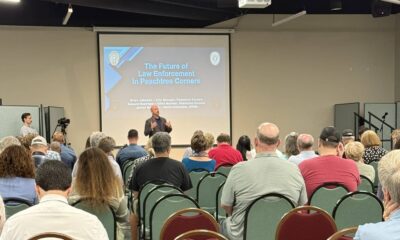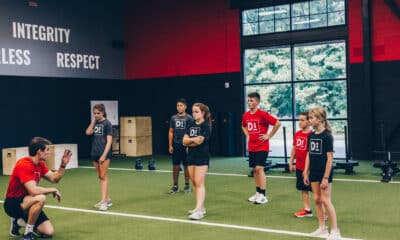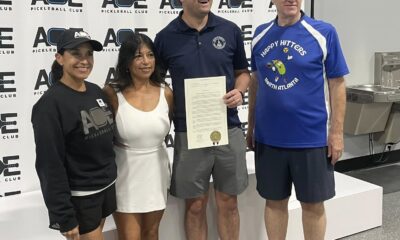Business
Concerts, V2X Live Conference, City Charter Amendment, Hotel Conversions, and more
Published
4 years agoon
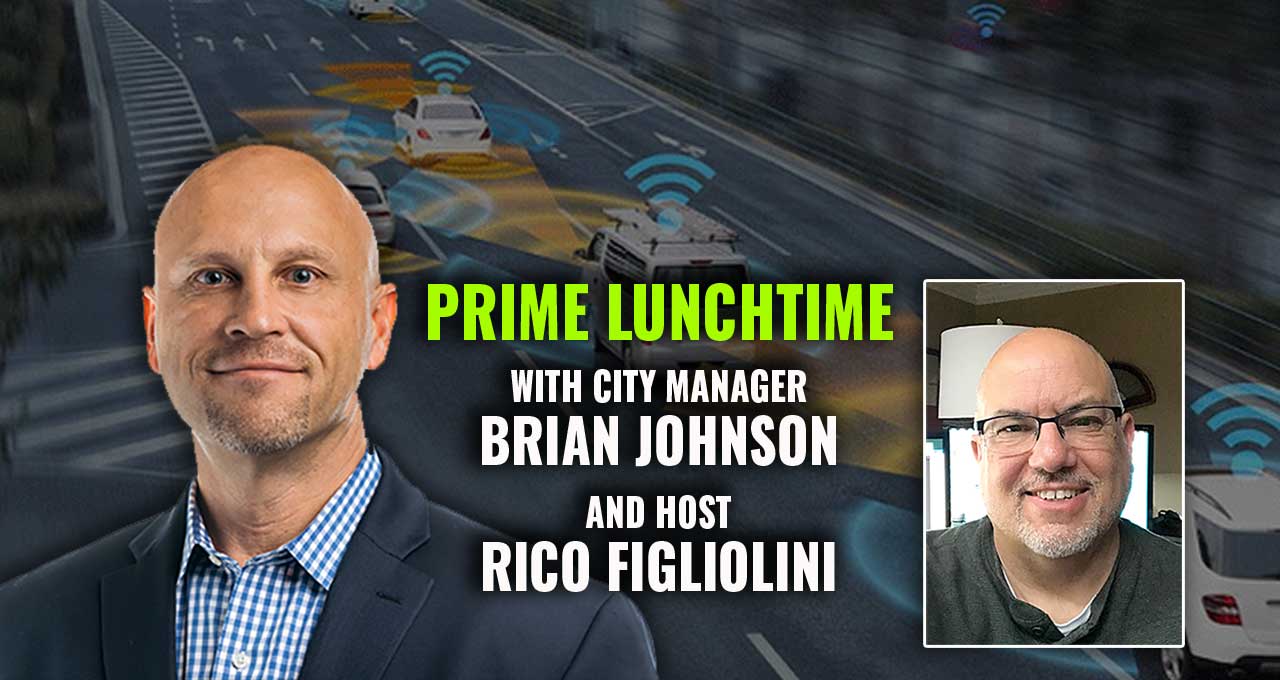
Rico Figliolini and Peachtree Corners City Manager Brian Johnson are back with another episode of Prime Lunchtime with the City Manager. They’ve got a ton of exciting news and information on the city of Peachtree Corners. Topics on this episode include: New Concert info, local economy updates, and information on the V2X Conference coming to the city in October.
Resources:
Info on the Concert: https://www.peachtreecornersga.gov/government/communications/city-calendar/-curm-7/-cury-2021
“We’re seeing indications that things are opening up… So you know, we’re optimistic as some of these things fill in, that our local economy will continue to get even stronger than it was. I mean, we’ve really overall been blessed. Our local economy has stayed pretty strong. And there are certainly some things that have closed that have been disappointing to see. But overall, there’s a lot of communities that are a lot worse off than we are.”
Brian Johnson
Timestamp:
[00:00:30] – Intro
[00:02:38] – “On the Border” Concert Info
[00:05:54] – Local Businesses Opening Up
[00:08:32] – Hotel Conversion Ordinance
[00:17:41] – Charter Amendment
[00:31:47] – V2X Live Coming to Peachtree Corners
[00:41:18] – Closing
Podcast Transcript
Rico: [00:00:30] Hi everyone. This is Rico Figliolini, host of Peachtree Corners Life. And today with Brian Johnson, the City Manager, we are doing Prime Lunchtime with the City Manager. Before we get to Brian, I just want to tell you what the show’s about ahead. We’re going to be discussing a little bit about what’s gone on during the last week or two. Certainly the charter amendment, the city charter amendment that happened this past city council meeting. I also want to discuss a little bit the new conference that’s going to be held in October. Did you know that vehicles are the most connected devices in the world now? Almost overtaking phones. So we’re going to have the V2X Live conference here in October. Which is about cars and vehicles and the connections they make to everything. So we’ll be discussing a bit about that. And we’ll also be discussing a little bit about recent development about the hotel development to possible apartments. The ordinance changes that happen and about a company that’s looking to target maybe two purchases in the city and possibly taking advantage of that ordinance. Whether or not that happens is a different story, but we’ll be discussing a bit about that. And just to let you know, also this weekend, On the Border, the Eagles tribute band, is going to be playing Saturday at seven o’clock. If you haven’t gotten your tickets, go to the city website, if it’s still available. We are at, I think the most capacity since COVID started where the limit is 4,000 at this point. So no circles, 4,000 in that oval area. Maybe a little outside of it. We’ll get more from Brian on that. Check it out. They might be only a handful of seats left, so you really have to get to it if it’s even available at this point. But look out for other concerts later in the summer as well as they come up. So let’s bring Brian on. Hey, Brian. Thank you for joining us.
Brian: [00:02:17] Thanks for having me Rico.
Rico: [00:02:18] Appreciate it. It’s always good to be able to talk about the things that’s going on in the city and be able to get facts out there and to discuss some of this stuff. Because I always have a thousand questions. Sometimes people tell me I have a million questions, but you know, you have to ask those questions to get the answer is sometimes, right?
Brian: [00:02:37] Sure.
Rico: [00:02:38] So just so then for those that may want to attend the, On the Border. So that limit to the concerts now in the Town Green has been lifted to 4,000, right? And I think we talked about at one point it was 6,000 was the most that it might’ve held pre COVID.
Brian: [00:02:54] That’s about right. So, you know I guess year and a half, two years ago we had a Queen cover band that there was no limitations, it was first come first serve. And it certainly spilled out into some of the areas outside of what we consider the developed part of the Town Green into the wood line and, you know, things like that. But we, our cameras counted about 6,000 people. So we, you know, that was, that probably is little bit more than we’d like. The reason that there’s a limit on this is, is not for that reason. It’s for COVID. Council had to make a decision about a month out before the event. Because we’ve gotta be able, there’s some logistics involved in securing the area and how many police officers we need and everything. And so they decided on this event to increase it from, I believe it was 2,500, the concert before this I think. And they increased it to 4,000. And so other than needing to reserve space to get inside the ropes, if you will, once you’re in there, there are no, the city’s not regulating your behavior. We’re assuming everybody is going to act in a responsible way as it relates to. If you’re not vaccinated, then you know, take whatever precautions you need. If you are then you know, operate, what makes you, however you feel comfortable. But counsel will hear in about a week and a half, will tell me if they want to have a restriction at all on the total numbers for next month’s concert, or if they just want to lift it and say first come first serve.
Rico: [00:04:42] Okay. So first come first serve meaning no reservations anymore?
Brian: [00:04:46] No reservations, no sit, no roped off area. It’s just the Town Green as we normally know it. And if you want to show up you, you know, show up. And if there’s a space somewhere, you can set your, you know, blanket up and do whatever. Kind of like you remember it the first summer we had.
Rico: [00:05:07] So, you know, I guess if we get to that point, it doesn’t matter when people come because people will come sometimes at two, even for a seven o’clock concert. But as far as this concert, this weekend will the, will it be roped off, like at a particular time? Two o’clock?
Brian: [00:05:24] Yeah, I think we’re keeping it at two, that seemed to work last month. We did a better job of telling the residents when it was going to be roped off.
Rico: [00:05:33] Right.
Brian: [00:05:33] They also understood the reason why we did it at all. Which is it’s easier to keep people from going somewhere to begin with versus having to kick them out. And so I think we’ll keep it that way. Because if not, I mean, we do have to set up the area at some point, so we would have to. And so that number seemed to be fine.
Rico: [00:05:54] Good. Great. So that’s a cool concert. Everyone should try to get to it. But again, there’s limited seats, so if you find it sold out, look at other concerts coming this summer. So you should enjoy that. Town Greens getting a lot more stuff. I mean, there’s more shops I think that opened. Playa Bowl opened not too long ago, a month ago, I think a month and a half ago. So I don’t know what’s going on with the old farmer retail there, but things are moving along. There’s more coming in. Even at the forum, there’s more shops opening over there. So the economy seems to be picking up a bit. I know that when I went out recently to a couple of restaurants, no masks. So actually hard to eat with the mask on. But people, I think that have decided that it’s not even worth bothering to walk in with a mask sometimes because you’re just going to take it off when you get to the table. So it’s hit or miss when people wear it, right? People are going into retail locations and wearing the mask. But half the people or two thirds of the people aren’t, you know. I mean, are you finding anything different going on economic wise? As far as new, I mean, there’s another new restaurant taken over, Nobel Fin, that Sage restaurant is coming in. You guys just approved the liquor license for them this last council meeting I think.
Brian: [00:07:06] Yeah. No, I mean, so you said it right. We’re seeing indications that things are opening up. That companies and people, entrepreneurs are starting to like make some decisions. And, you know, and sometimes try to capitalize on opportunities. And so we’ve had some vacant space that the pandemic caused that have turned around and had somebody, you know, say, Hey, maybe now’s a good time. So you know, we’re optimistic as some of these things fill in that our local economy will continue to get even stronger than it was. I mean, we’ve really overall been blessed. Our local economy has stayed pretty strong. And, you know, there are certainly some been some things that have closed that have been disappointing to see. But overall, there’s a lot of communities that are a lot worse off than we are.
Rico: [00:08:05] And there’s a lot of jobs still needing employees. I know, you know, every time I go to pass a restaurant, I mean, almost it’s almost seems like every other restaurant has a help wanted sign. From Dunkin donuts to Salada, to other places. It’s like hard to find people willing to work. In the retail and the restaurant business, at least. So, you know, they’re opening up, but they’re also getting crunched as far as whether they have help or not.
Brian: [00:08:30] That is true.
Rico: [00:08:32] Yeah. The other thing is, economically speaking too I mean, obviously the city has 12 or 13 hotels. Including the Hilton as well as long extended stay hotels and stuff. And the city just passed an ordinance about redeveloping may be possible with criteria’s and restrictions to hotels converting to apartments. Obviously hotels are one bedroom, you know, rooms and stuff. There would be tremendous amount of renovation going on, but I think the city limited to any hotels that are either extended stay, under 50% occupancy for a period of time, or are changing you know, lost their brand like you know, whatever. Like if you were a national chain, but all of a sudden you’re not a national chain and you’re just a one-off. That there’s a possibility for that to happen. So I hear that there’s a multi-billion dollar company, a holding company, real estate holding company that is targeting a possible two hotels in the city of Peachtree Corners for possible redevelopment. So I know you may not know which hotels, but. So tell us a little bit, just refresh our memory in brief about what could happen, couldn’t happen. And just let us know about that.
Brian: [00:09:43] I mean, you did a pretty good job. So, you know, the hotel industry in general, I mean, everywhere, got significantly effected by the pandemic. And so of course there’s been some changes in that. That industry is still under some duress. But as a result of that, there have been some companies that have decided to take advantage of that. Not necessarily advantage, but use this as an opportunity to potentially create a unique product. And that is to take a hotel that is in some level of duress and convert it from hotel to apartments. And so this company that you mentioned, that’s been kicking some tires around Peachtree Corners is doing it in a lot of places. They’re doing it wholesale. Lots of different, yeah, municipalities are having the same thing. Now, in our particular case when it comes to hotels, we might be especially ripe if you will for there to be opportunities because of two reasons. One, we started, you know, pre pandemic, we have a significant amount of hotels. A lot more than people realize in the city. And so there’s a lot of hotels to look at. The second thing is our hotel industry tends to be very business traveler centric. And so, you know of all the people going into hotels, the ones that are going back right now are not really the business traveler. It’s the vacationer. And so if there was a type of you know, a hotel that, or a group that a hotel caters to. The ones that cater to the business travel might be a little bit even more under stress then the vacation right now. So that’s why we think that there might, there’s two properties here that might, you know, be in the cross hairs of this company for them to do the due diligence. Now we don’t know, the company hasn’t like laid out to us exactly which ones per se. We do know which ones are not under duress. And so we do know which ones, you know, we can say are doing fine. We have a pretty good relationship with the hoteliers in the city. And none of the branded hotels, the ones that are under a flag of a national brand, whether it’s Marriott, IHG, you know, and their sub brands like Residents Inn, Homewood Suites, that kind of stuff. None of those are the ones that are you know, at a point where they want to consider selling to this company. We do have a few that generally tend to be on the south side of the city that are no longer branded. And you know, so we suspected that it may be one of those. Now again, so one last thing to consider is on the ordinance, we knew this was coming. So there’s been, as we keep up with trends out there. We started to see that, yes, there are hotels that start going through a cycle when they are not performing well. And there were some companies that are maybe wanting to convert. And so counsel, so what I did is I presented them an ordinance and I said, here’s the deal. This phenomenon is coming, or it is here. It could certainly be here very soon. And we probably should put some thought behind what we want to do if a company comes to us and says, Hey, we want to take this hotel, buy it and convert it to an apartment. What, you know, how would you regulate that? Do you allow it? And so council considered this versus saying, no, we don’t want to have anything. And their, you know, their ultimate stance that they, a majority of them took is with the regulations, with restrictions on how it would be developed and how much capacity could have, how many bedrooms it could have, things like that. They preferred to with a high standard, at least, have this in place so that if somebody wants to do it, they can do it. They can, there’s a mechanism for them to do it versus us just categorically say no. And then the hotel owner does one of two things. He or she continues to drop the room rates until they can fill enough rooms to make some money. And that usually doesn’t end well. Or they turn it into really, really long-term. Which almost acts like an apartment anyway. Or the worst is they just shutter the doors. And you know, so the council was like, look we don’t like those options. We think the alternative is to spend some time, come up with a well-thought-out ordinance. If a company comes to us and wants to do it. We have a mechanism for them to do it, but that they have a very narrow band to do it. We don’t say, oh yeah, sure. Whatever. We look forward to your product and cross our fingers. It’s highly regulated on how it transitions from hotel to apartment. But we feel like that would be a better product than the alternative. Now, mind you our first, you know, our first option or our preferred option is for the hotels to start performing great. And to, for them to be operating the way that they originally went in. That is certainly our preferred method. But if a gun is held to our head and it’s, you know, do this, or it’s going to shutter their doors and become a vacant property or one that just allows almost anybody in or rents by the hours as the case may be those kinds of things. We don’t want that versus a, well, you know, a well-regulated conversion into apartment.
Rico: [00:16:02] I think this is what a good city does, right? Like you said, you find trends that are happening across a competitive landscape, right? And you come ahead of that curve before waiting to see what happens. I mean, a city has to be able to be proactive in a lot of what they do, not just in the economic sphere of encouraging new business coming in, but to look at redevelopment, look at all of it. So I think you guys did a good job in coming up with that and being able to address it and maybe not the deny it. Because denying it or saying no, we can’t. You know, Sandy Springs, for example, I think was entertaining the same thing. And they said, no, we’re not going to do that. Well, that just doesn’t look at the reality of life and what can happen if you don’t allow some options there, right? So having some options and actually control over your own destiny is always a good thing. So I appreciate the city looking at that. You know, I mean, you guys have done the redevelopment authority. You know, I’m sure there’ll be more stuff coming out of that soon. You know, and addressing things like, for example, just recently, I don’t recall the name of the company, but it was like a $42, $45 million purchase of the corner center, I think it was. Which is an apartment complex on Holcomb Bridge Road, I think or Peachtree Corners Circle, right. So they just purchased that and you know, these things are gonna happen. Economic purchases, REITs are going to come in real estate investment groups like PEG is a real estate investment holding company. They’re not, you know, they go in and they buy stuff cheap and or wherever they can negotiate and then build something out that can give them cash. I mean, that’s what they’re in business for.
Brian: [00:17:39] That’s what they do. Right.
Rico: [00:17:41] Yeah. So and there are companies out there that actually do that with I think it was American Federation. They go out and buy residential property. Homes. And build up that and buy that and then rent them out, sublease them. I mean, so that’s going on, certainly going on in this market, that too. And it’s hard to find a house. The I mean, there was one article that I forget which paper put out, that there’s too many real estate agents now and not enough homes to list. Got that going on. Let’s talk a little bit about the charter amendment that just happened this past city council meeting. Originally, I thought it was a great idea to do what we discussed in our last podcast to give the city more, not more time, but to give the city sort of emergency powers, if you will. To be able to address something on a quicker basis than otherwise is being handled. But obviously that got a lot of protest against that. People didn’t like that idea. So tell us what happened Tuesday night with this amendment. Because it didn’t pass or at least a portion of it didn’t pass.
Brian: [00:18:46] That’s correct. So in the course of other activity, we will sometimes review documents and we needed to review the charter. Something came up when we were looking at it one day and we uncovered essentially a Scribner’s error or a typo. And so we were like, oh you know, we need to look at it. We looked at it and found two more. And so I had been sitting on it for a while and it was just, I had an agenda that I thought was just, let’s just get this out of the way. So we put it on there, but in the course of that, you know, charter amendments are a very formal event. As it should be, the charter is the city’s constitution, if you will. So it should be a, you know, a process that’s well thought out. And so when you have the, you know, when you crack that thing open, sometimes it’s a good time to make other changes while you’re there. It’s almost like the medical community you’re going to crack somebody’s chest open and get in there and do something. Why not fix something else that’s been nagging them or whatever. So one of the things that, even when it got here, having managed other cities, I found unique and that is a requirement that there be two separate reads at two separate meetings. And that in and of itself was not odd. One of the other two cities I managed had that mechanism. That was the normal course, but there was also a mechanism that if a majority, in the case of the other city, it was just the majority. Here the proposal was unanimous consent. If there was consent to waive that requirement, you could in fact have that second read and the vote at the same meeting. And it existed for instances that were emergent, but not necessarily emergent for the entire city. Like you’ve got to drop what you’re doing and do it. I mean, you could argue that the mask ordinance requiring the wearing of masks during a pandemic was a city-wide emergency situation. And, you know, it needed to be moved in fast. And we have a mechanism in the charter now allowing for emergency ordinances, but it only is in place for 30 days. And it has a very high standard. There’s gotta be a risk to life, limb, you know, property type of thing. And if that’s not the case, then it doesn’t meet that standard. So there is a, there are instances where it doesn’t quite meet that standard, but yet it is kind of exigent circumstances, an emergent situation. So I just thought, Hey, why not put a mechanism in there on the off chance that those situations happen, that you at least could do it. And we made it to where it was a unanimous consent of all council members. It wasn’t even just the ones that are present. Literally all seven of them would have had to at the meeting where the first reading took place would have had to have said yes, Mr City Manager, what you were just presented. And you’re asking us to waive that to a meeting requirement. This situation does in fact, warrant us doing it at this meeting. And all of us are going to actually be forced to raise our hand and vote yes, that it is emergent. I’ve seen that a lot of places and let’s remember a lot of cities don’t even have a two read requirement.
Rico: [00:22:36] Right. That’s not the norm.
Brian: [00:22:37] Yeah. There’s a lot of cities that you just it’s, you have the reading and the public hearing and the vote at the same council meeting. And the argument there is people track this thing one time, you know, it’s going to be at one meeting unless there’s a formal vote to table. In which case you will already be at that meeting to hear about that. We don’t, we don’t need a two read every time. And so that’s probably more common than the other. But for cities that do have the two read there’s oftentimes again, that mechanism to do it. So I submitted it and there were a lot of people who were opposed to it. You know, and they showed up and spoke and council said, you know what? Maybe now’s not the right time or in some cases, maybe they don’t ever want to do it. I mean, look, it was good to see people you know, A, watching things. You know, sometimes you wonder how many people are even civically active and knowledgeable about what’s going on. That was good. Two, you know, it was great to see a forum for people to show up and express their, you know, their opinions. There still is some confusion about what was being asked. You know, that was the disappointing part about, you know, lack of transparency and it’s, you know, you’re kind of like. You know, we could still have a special called meeting right now under our current charter. If I needed something done fast, I could actually call for a special call meeting tomorrow night. And if the mayor himself or a majority of council wanted to have agreed that we need to have it, we could have a special called meeting. You could argue that that’s less transparent than doing it always at a council meeting because everybody can put those council meetings in their calendar. I mean, it’s always going to be at the same time of the month, same, you know. But special called meetings, they may miss. And so somebody could have missed that and say, well, you did this, you know, I’m not tracking a city council meeting on a Friday night or something. And that was the argument some people were making is, oh, you could already do a special called meeting. Well we can and I guess if it ever comes to that, we will.
Rico: [00:24:48] Because what’s the notification time for a special meeting?
Brian: [00:24:55] It’s 24 hours.
Rico: [00:24:56] Okay. So versus it being on the agenda and everyone knows the city council meeting is the fourth Tuesday of the month. And that it wouldn’t just, you know, I mean, it just doesn’t show up 24 hours ahead on the agenda.
Brian: [00:25:09] Correct. It’s also live streamed and recorded and posted on the website.
Rico: [00:25:17] Right. And the fact that you had unanimous vote to be able to even consider the subject. I thought it was awesome. Because you weren’t…
Brian: [00:25:26] If just one council member, like you say, said this isn’t emergent enough for me and I vote no. And then that’s it. Literally all seven had to. Go ahead.
Rico: [00:25:39] No, because otherwise what happens is, let’s say it’s an ordinance and the city council votes on it and it’s, you know, whatever, four to three or something. It could be that, right? On the second thing, on the second read. But on the first read, and if you wanted to move to a vote that, you know, unanimous part is important, right? All the council people have to vote on allowing a vote. And then you would think…
Brian: [00:26:04] And then you still have the public hearing and you still have to vote on the agenda item.
Rico: [00:26:10] Yes. So I’m disappointed a little bit in that some people actually don’t know what it was about. But they came out, you know, and they found out. I think the same people found out at the meeting, because it was explained. But sometimes people still don’t quite get it. And, you know, there’s an opinion on everything. Maybe they, you know, maybe that’s a good thing that for now it’s not allowed. We’ll find out in the future, if that was a bad choice.
Brian: [00:26:37] Well you know, Rico. It’s interesting that you bring that up because we technically could have even had a real world example. Would it have been determined to be emergent, but some of the people were asking, well, you know, when do you ever feel the need to move quickly, but it doesn’t apply to citywide stuff. Well, we just had an issue this last weekend, where an individual rented out through Airbnb, his pool. So the rental mentioned that it was a, it was the rental of a pool, not the rental of a dwelling as our code has. And we do not allow for rentals less than 30 days. Or actually less than 31 days, it has to be 31 days or more. And so you can’t do an Airbnb for anything less than, you know, 31 days or more. But it says to rent out a dwelling. And so an individual rented out a pool and ended up having, there was probably approaching 50 people. You’re not supposed to even have 16 on any, more than 16 through Airbnb anyway. Upwards of 50 people that showed up. And the police were called and technically speaking with the pool thing, the argument was, we’re not violating the ordinance cause it’s not a dwelling and you just get into this. So my point to that is we are going to do a text amendment of our code and amend that to ensure that it’s the dwelling and any other, you know, amenities outside of that. But that could have been considered for the neighborhood. Like if you live next to this house, you would consider this an emergent situation. You would be like, look this is a good example of change that code quickly. So that I can go ahead and feel comfortable that they can run through this loophole. And instead we’ll introduce it, it’ll be 60 plus days before it’s voted on. And again that’s fine, if the residents want that, enough of them. And that’s why council, it was good to see people that say their opinion and counsel listened. And there was certainly more people that showed up and sent emails that were against it than forward. Although that’s usually the case, but that’s fine. I mean, that’s how democracy works. That’s how the city works. Council was responsive. And we’re going to drive on and move on and, you know, that’s it. But yeah, so the only disappointing part is if there were still some people who truly still don’t understand what this was and was it’s about, and how the protective measures that were in place, where you could argue even more restricted than the current one. And I just hate people making decisions based on false information or a misunderstanding.
Rico: [00:29:43] Misinformation versus this information, I guess they just don’t, they’re not, you know, everyone has an opinion too, obviously. So, you know the fact, like you said, I mean, it always happens that the cons are always, the no’s are always the ones showing up versus the, yes. The people that don’t have a problem with it are not showing up saying, yay, good job. This is exactly what we want. It’s usually the no’s that show up and say, why is government doing this? I want them off my back. I’m a libertarian. I’m a conservative. These are things you shouldn’t be doing as a government. Oh, by the way, the city probably shouldn’t exist. To some degree, you know, and they have the right to say that and they can, you know, there’s a belief there of that, and that’s fine. But that shouldn’t drive the evolution of a city as it evolves into doing good stuff. That they, you know, that that has to be taken into account every time to the detriment of, of other people possibly. So like you said, that particular, I’m sure if I lived next door to that, it’d be like yes. I would definitely want you to change that because the police could probably say, well, we could do disturbance of the peace, there’s too many people there. But what stops it from happening again, legally, you know?
Brian: [00:30:56] And you know, again, we’re going to change this. So it’s not like we’re not, it didn’t prevent us doing it. But you know, look. Again, that’s how it’s done. It was great. Clearly the, you know, the greatest number is what council heard that night. And they, you know, or that was presented that night. They heard it and they said, you know what? Now’s not the time. Maybe it’s not ever, I don’t know. But you know, I, as a resident of the city, I’m glad to see my city council. You know, to sit there and listen and say, look, we’ll reserve judgment until the bitter end. And they did. And so I’m glad to see that as a resident. I mean, sometimes it can be frustrating as an employee of the city. But as a resident, I’m glad, you know, council does it that way.
Rico: [00:31:47] And it’s always, it’s always good people show up. I mean, I like that. I prefer at least an active citizen. Because it just makes, it does make things better. Because you have to make sure that you do things a certain way, right? Dot the I’s, cross the T’s and stuff. So, I mean, that’s not a bad thing necessarily. Right. Last thing I want to talk about is something exciting too. I mean, obviously hotels, are opening up. We had a jobs fair this past weekend for the hospitality industry here in Peachtree Corners. Because, you know, I remember at one point as the Hilton was opening up, they could only open up certain floors because they didn’t have enough employees to clean all the floors for example. Getting people back to work is a little difficult post, I don’t want to say post COVID, but emerging and opening up for business. It’s a little tough for the hospitality industry to be able to get the work they need. So I’m glad they’re able to do that. And because of that, we’re able to bring in conferences and other things. So I’m excited to hear that the V2X Live conference is coming to Peachtree Corners. I mean, you guys were involved two years ago in the Smart City Expo, but that came in to Atlanta. And you know, and the city had a good, good representation there. And people from that international, national expo come out to the city. So now we have this V2X live. Because as most people might not realize cars are becoming the most connected device in the world at this point. And electric cars are moving towards being the norm by 2050, 2035. And even sooner. I mean, a lot of these companies are coming out. Volkswagen, Ford, all coming out saying they’re going to be like almost all electric at some point. So that, you can’t have self-driving cars without electric cars, right? I mean, they go hand in hand. So tell us a little bit about the V2X Live that’s going to be coming in, in October. That’s going to be, I think that’s through a partnership or because of Curiosity Lab and stuff. So tell us what’s going on with that, Brian.
Brian: [00:33:54] Alright. So as conferences go, you know, conferences have a theme, if you will. A reason to hold it. And a lot of times conferences, new conference themes are spinoffs of emerging technology from conferences they used to be a subset of. So you could have had a automotive conference and back in the day, you at some point had this subset where they were talking about cars being able to talk to something else and people are wow. You know? And so over time, connected vehicles and all that comes with it, you know, you’ve got the vehicle itself and that whole part of that, what is it going to say? How? Who’s doing it? Then you’ve got who’s listening? Because you’ve got vehicle to infrastructure, vehicle to vehicle, and I mean, you have vehicle to all sorts of stuff. And so all of those have their own subset, and then you have the software that you’ve got to do all this. You have this large ever-growing industry around connected vehicles. And it has merged off in one of the companies that does a lot of different conferences decided to be the first to create this conference on its own. And so it went through a due diligence period. And said, we’re going to create this brand new conference we’re going to be the first one to do a connected vehicle conference called V2X Live. Vehicle to everything Live, is what V2X stands for. And they did a due diligence and they wanted to pick three locations in the world to start this series. One in Europe. They chose Frankfurt, Germany. And they wanted to do two in the states, one in the east coast and one of the west coast. They picked a city I believe is Santa Clara, but a city in Silicon valley on the west coast. And because of Curiosity Lab, Peachtree Corners was picked on the east coast. Now mind you, when I say Peachtree Corners, as opposed to Smart City Atlanta that is held in the Georgia World Congress Center. This conference will actually be held in Peachtree Corners. And so the conference will be a little bit different in that it’s not one conference under one with everything under one roof. This is a little bit more of, call it an experiential one. And of course the reason is, is we actually have a vehicle to everything environment. I mean, we have created that city street where a vehicle that is capable of doing this, could drive up our track and be talking to every light pole, every other vehicle, every pedestrian who has a phone, every traffic signal, every pedestrian crossing all the way up. We have that environment now. And they want to do a conference where you can actually talk about connected vehicle and get out and in some cases, see them in action. Like literally be standing under a light pole that has the technology to talk to the car. And have the companies that provide that be there and have a tent set up. And so it’s going to basically be a linear conference. In that the conference host hotel will be the Hilton. And there will be a significant presence though, call it a host hotel, A and B. A would be the Hilton. B will be the Marriott. Our two conference hotels here. And then there will be a lot of meeting space there. Of course, the rooms for the conference attendees, and then breakout sessions and you know, and demonstrations will be up the track. So as you go, essentially north up the track, there will be some breakout and panel discussions held at City Hall. And then there’ll be locations of the track where you may have, you may have, Watt Way who does the solar roadway have a tent. And they, people can go out there and see our solar roadway. And then we’ll have more at the innovation center where you have breakouts. And then there’ll be even more so up at Atlanta Tech Park at the other end. And so we’re looking to do this conference. The cool thing about it is its ability to pump activity into our local economy. So now you’re talking, they are projecting maybe about a thousand conference attendees in year one. Because it is a new conference. And so that’s a lot of hotel rooms and maybe it will be more, I don’t know. But that’s a lot of hotel rooms that’ll be filled. So that, you know, for two nights, at least. And then it could even be more people during the day if Metro Atlanta, you know, people who live in Metro Atlanta show up. And then what we’re looking to maybe do is. Instead of having the keynote address at the beginning of the day, which is oftentimes what you see on a conference, is we do it at the end of the day and we get everybody to go up and we hold that keynote address up at the Town Green using the stage so that when you’re done with it, you’re already at our entertainment district and you can already eat right there and maybe we have a concert afterwards. And so we’re looking to pump more activity into the Forum and the Town Center. And, you know, we’ll have a bunch of pretty cool demonstrations there. We’ll have a bunch of autonomous vehicles for it.
Rico: [00:39:36] Yeah. That would be, that would be cool. People will get a chance to take a look at those autonomous vehicles, maybe tented areas with other interactive and such things going on. That would be a great experience, I think for local residents also. Besides bringing in, like you said, possibly you know, a thousand people economically impacting hotels and restaurants and all that.
Brian: [00:39:56] But you know, it’s just an example again, where, you know, our residents have been very supportive of Curiosity Lab because we have told them of its ability to do these kinds of things. And it continues to outperform expectations and its presence in what we’ve done with it and the activity that it has generated and putting us on the map. It got these conference organizers to reach out to us. And we told them what it was about. And they sent a delegation and they looked at it. We talked through the details and they said, you know what? We’d like to do it there. We think that would be a really unique conference. And so Curiosity Lab continues to deliver in its ability to generate activity for the city.
Rico: [00:40:43] Yeah. Exciting because activity begets activity. Companies, organizations will see this V2X Live conference, be looking at the city in a different length because of that conference. So we may end up seeing much more coming out of this than just that conference certainly.
Brian: [00:41:04] I hope so. So yeah, it’s exciting. It’ll be in the middle of October. There’ll be an announcement coming out next week. A formal announcement, website for it is almost done. So yeah, it’s some exciting stuff.
Rico: [00:41:18] Excellent. So much stuff going on in this city. Things that keeps us busy, gets this podcast going every month. And being able to, and we haven’t even talked covered everything really. I mean, there’s a whole bunch of things that we could have covered. These are the top things. I hope everyone enjoyed this show. If you have any questions, post them down in the comments. I’ll see about getting those answered. If I don’t have the answers for them. Check out again, the concert this weekend, there might be some tickets left for On the Boarder, a tribute band. And check out the rest of the summer schedule and keep an eye out cause there’s a lot more new businesses opening up in Peachtree Corners. Just five or six in the last, retail businesses in the last month or two recently opened here in the Forum, Town Center and on I believe Jimmy Carter. So check it out. Brian, I appreciate you being with me. It’s always good to have you and always great to get the right answers. And good answers and solid answers. Thanks, Brian. Thanks everyone. Look out for our next issue. We’re working on it. That’ll be out the in first week of August and just hold some of these dates. There’s the Peachtree Corners festival, which is happening in September, I believe. And so that’s happening at Town Center for the first time. So that’s going to be working out there and then Light Up the Corners. I believe that’s happening in August. So check that out and we’ll be back to you with more information. Thanks everyone.
Related

Business
Peachtree Corners Grows Business Opportunities Through Economic Development
Published
1 week agoon
May 6, 2025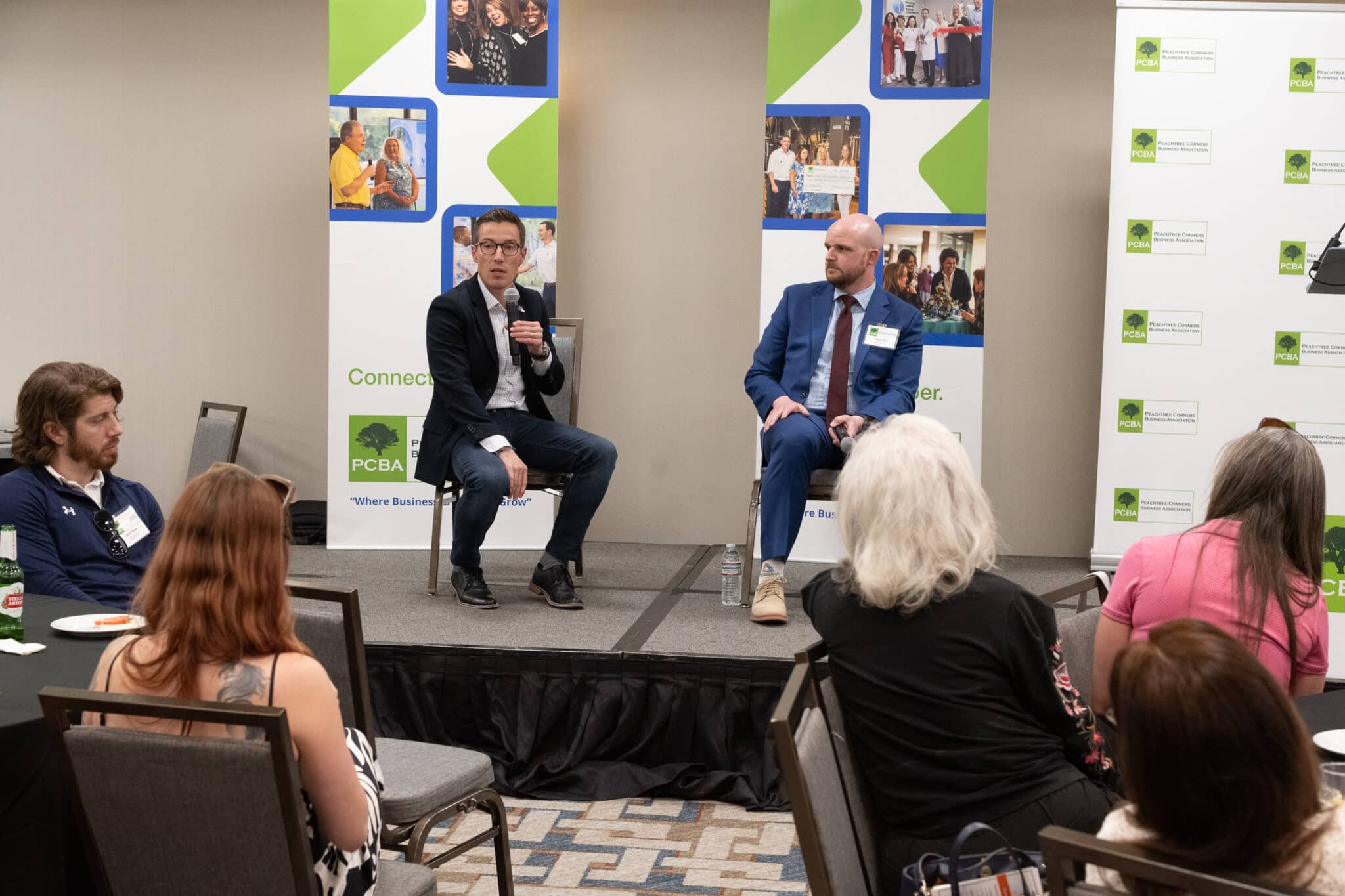
Most residents and business owners in Peachtree Corners probably think they know all about the economic development and strategic planning of Peachtree Corners, but do they really?
Peachtree Corners Business Association invited Peachtree Corners Economic Development Director Betrand Lapoire and Partnership Gwinnett Director of Economic Development Andrew Hickey to its After Hours Speaker Series on March 27 to discuss the city’s growth from a 1971 master plan to a bustling city with 42,000 inhabitants and 40,000 jobs.
Key points included the importance of business retention and expansion, with 24 projects last year creating 1,600 retained jobs, 1,600 new jobs and $250 million in new capital investment.
The Curiosity Lab, a world-class innovation center, was emphasized as a significant attraction. The city’s zoning and infrastructure plans were also discussed, focusing on balancing office and residential development to maintain a vibrant, sustainable community.
Matching jobs to residents
Although Peachtree Corners is just a teenager in terms of being an incorporated city, the foundation for this vibrant, fast-paced economic hub was laid more than 50 years ago by technology pioneer Paul Duke.
“Peachtree Corners was the first master-planned, business innovation technology park in metro Atlanta,” said Lapoire. “It was in response to the brain drain of technology with Georgia Tech graduates leaving the area.”
While the city may have a small-town feel, it’s the largest in Gwinnett County by population, but not land mass, he added.
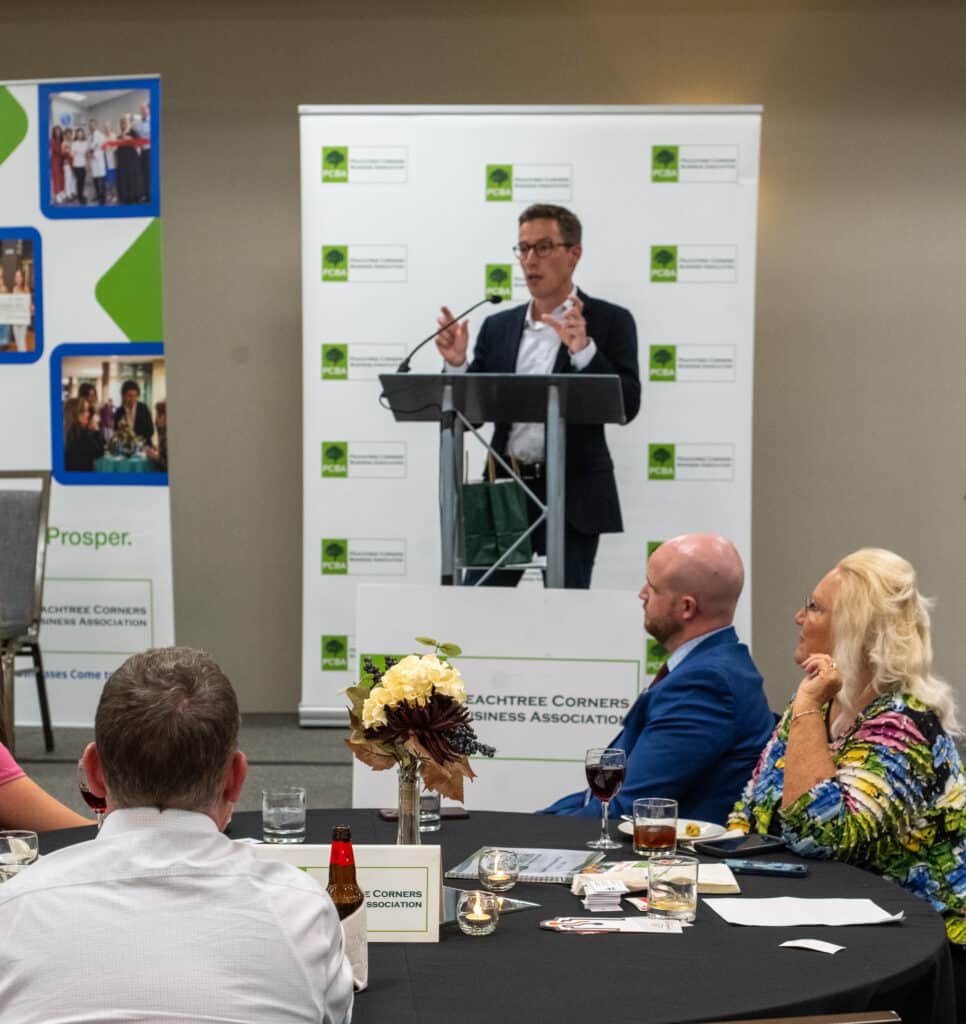
“The city started from a commercial, industrial, R&D base and then was expanded around it,” said Lapoire.
Though home to more than 42,000 residents, most of the jobs in Peachtree Corners are filled by people who live outside the city, he added.
“So we have this interesting mismatch, in a way, although not unusual,” said LaPoire. That creates traffic and transit issues. So that means that one of the solutions is to create more jobs here to fit the profile of the community.”
He presented charts that show professional services, consulting and engineering as the largest job categories. The next tier of businesses are wholesale and manufacturing.
“So we have a good mix of industry,” he said.
A five-year plan
The city has a five-year economic development plan (2023-2028) that outlines strategies for attracting and retaining businesses, with education and workforce development being key components.
Partnership Gwinnett has similar goals as Peachtree Corners, but on a larger scale.
“We are the county’s sales and marketing arm for all 17 cities now, and we receive funding from both municipal sources as well as existing businesses here — both in Gwinnett and outside of Gwinnett as well,” said Hickey.
He shared how Partnership Gwinnett is designed to drive a lot of major corporations toward doing business inside and with Gwinnett County.
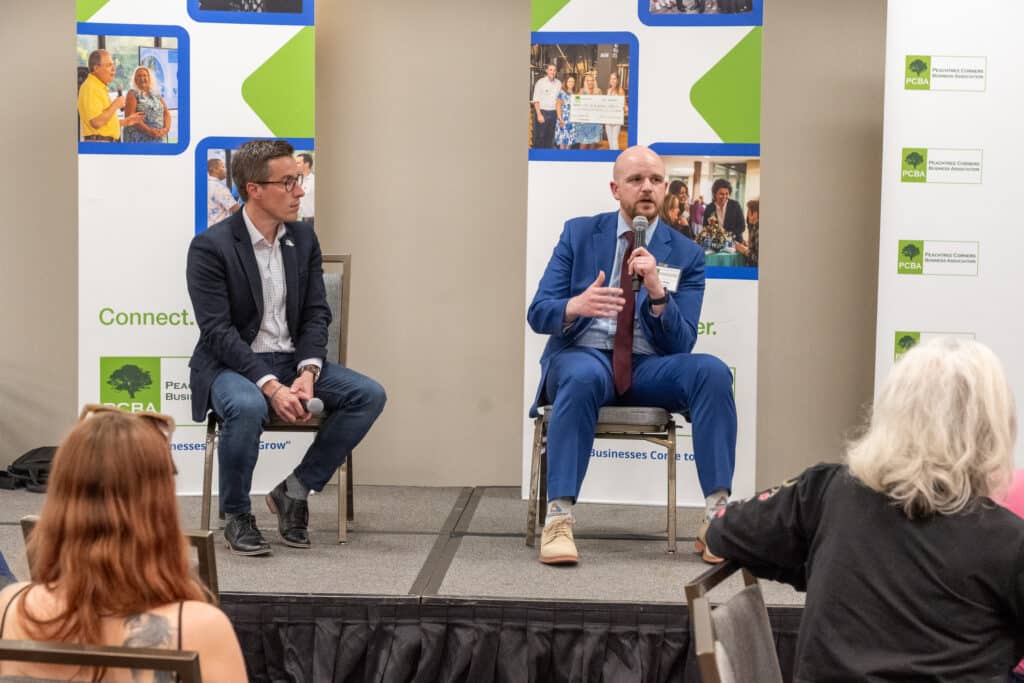
“One of the biggest things that we talk about that I’m sure it seems like most of us here, if you live here, you work here, you understand it. It’s the diversity that exists here in Gwinnett,” he said. “With a diversity index of 85, that means if we walk out of the Hilton here and we say hello to somebody, there’s an 85% chance they’re from a different ethnic or cultural background than ourselves, which to you and I may seem normal because that’s the life that we live in.”
He added that for companies, there’s a tremendous value in that, whether they have stated values, or they’re just making hiring decisions to get a wide range of candidates to fill those roles. Additionally, because of the proximity to Atlanta, Gwinnett County has a great labor draw.
Partnership Gwinnett
Partnership Gwinnett plays a significant role in recruiting businesses, expanding existing companies and developing the workforce. Hickey showed how the organization was involved with more than 24 projects last year.
“A majority of those were expansions, and that is a common thread you’ll see in economic development,” he said. “In business retention, expansion is so vital to working with our existing companies to make sure that they have the resources they need.”
He added that’s what leads to new investment and job creation in the community.
The organization also focuses on redevelopment projects, working with cities and the county to improve infrastructure and community amenities — especially strong educational institutions such Georgia Gwinnett College, Philadelphia College of Osteopathic Medicine and others.
Quality of life
In closing, both men stressed the importance of recruiting companies and developing the workforce, along with one aspect that means a lot but may not be as obvious — quality of life.
“It’s definitely evident that people like to work where they live — the whole live, work play experience,” said Hickey. “I joke that the part that people really have the most questions about, and are most excited to learn about, is new events at The Forum or Gwinnett Place Mall.”
Although they want to know what’s the next major company coming to Gwinnett, people REALLY want to know about how to spend their leisure time.
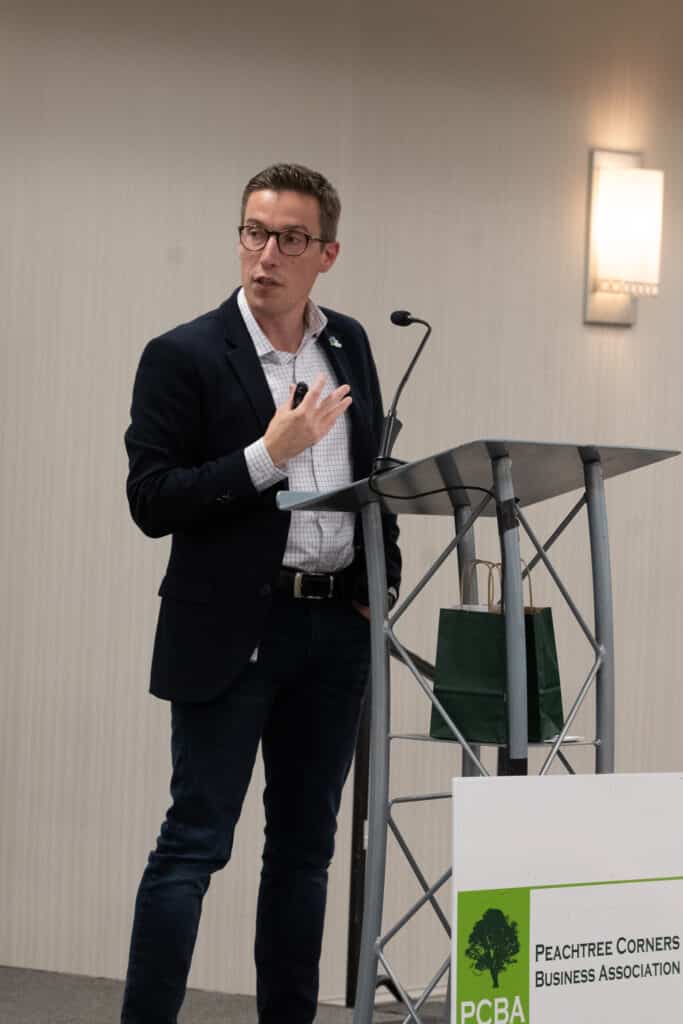
“That speaks to the importance of ensuring that we have a great community,” he said. “So at Partnership Gwinnett we work with all of our cities, and the county government as well, [on] a kind of a best-practices trip.”
He added that the peer tour allows everyone to know what the neighboring communities are doing and share the good news.
“We will take all of these elected officials, but also city staff, to different cities across the Southeast,” he said. “Last year, I believe they went to Huntsville, and have been to Greenville, Chattanooga — all cities that have done some really cool redevelopments that have taken their city to the next level. Our goal is to learn from them.”
Related
Business
Two Peachtree Corners Business Leaders Named Finalists for EY Entrepreneur Award
Published
3 weeks agoon
April 23, 2025
Ernst & Young’s Entrepreneur Of The Year celebrates ambitious entrepreneurs who are shaping the future
Ernst & Young LLP (EY US) recently announced the finalists for the prestigious Entrepreneur Of The Year 2025 Southeast Award, and two local, Peachtree Corners business leaders — David Quirk, president and CEO of DLB Associates Consulting Engineers PC and Erin Hanson, founder and CEO of Guardian Sports — made the list.

Hanson’s Guardian Sports is a family-owned company dedicated to serving athletes through safety and performance improvements in sports equipment. Major products include the Guardian Cap, PEARL ball and Guardian Infill serving the sports industry.
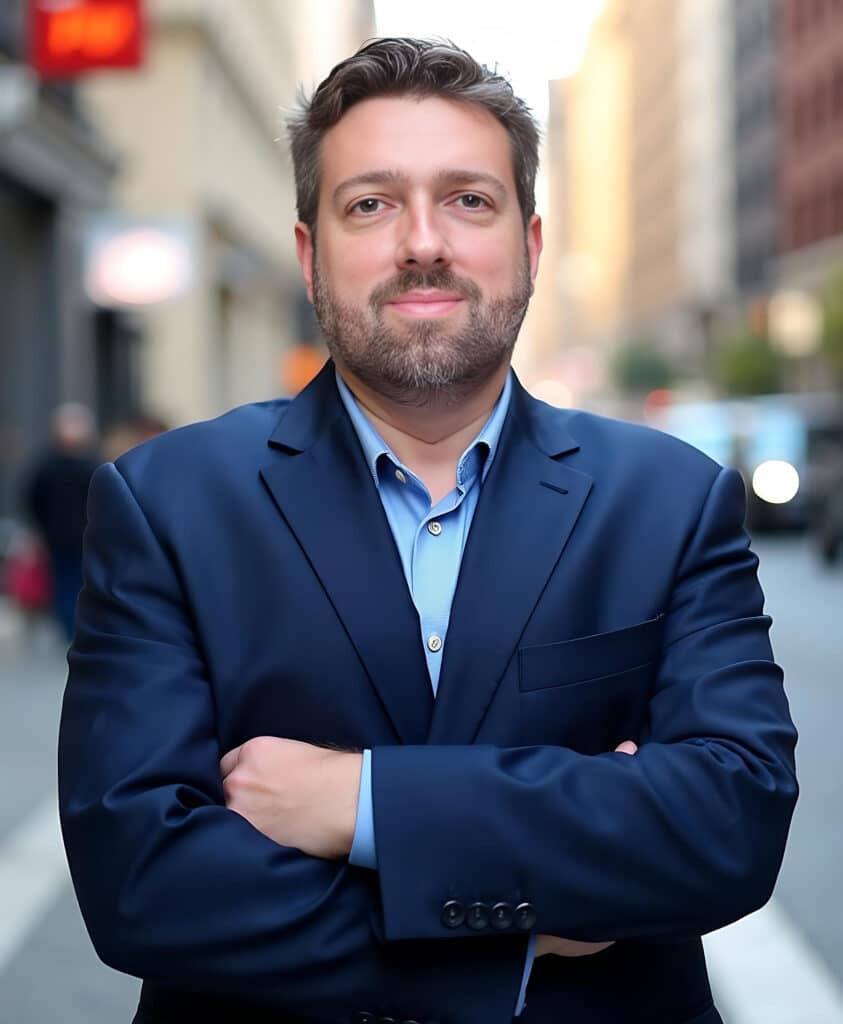
DLB Associates is a U.S.-based consulting engineering firm specializing in mission-critical and complex built environments. With more than 40 years of expertise, DLB delivers innovative, technology-driven solutions in engineering, commissioning and operations worldwide.
Celebrating entrepreneurial leaders
Now in its 40th year, Entrepreneur Of The Year recognizes the bold leaders who disrupt markets through the world’s most ground-breaking companies, revolutionizing industries and making a profound impact on communities. The program honors those entrepreneurs whose innovations shape the future and pave the way for a thriving economy and a hopeful tomorrow.
The Southeast program celebrates entrepreneurs from Alabama, Georgia, North Carolina, South Carolina and Tennessee.
An independent panel of judges selected 36 finalists for their entrepreneurial spirit, purpose, growth and lasting impact in building long-term value.
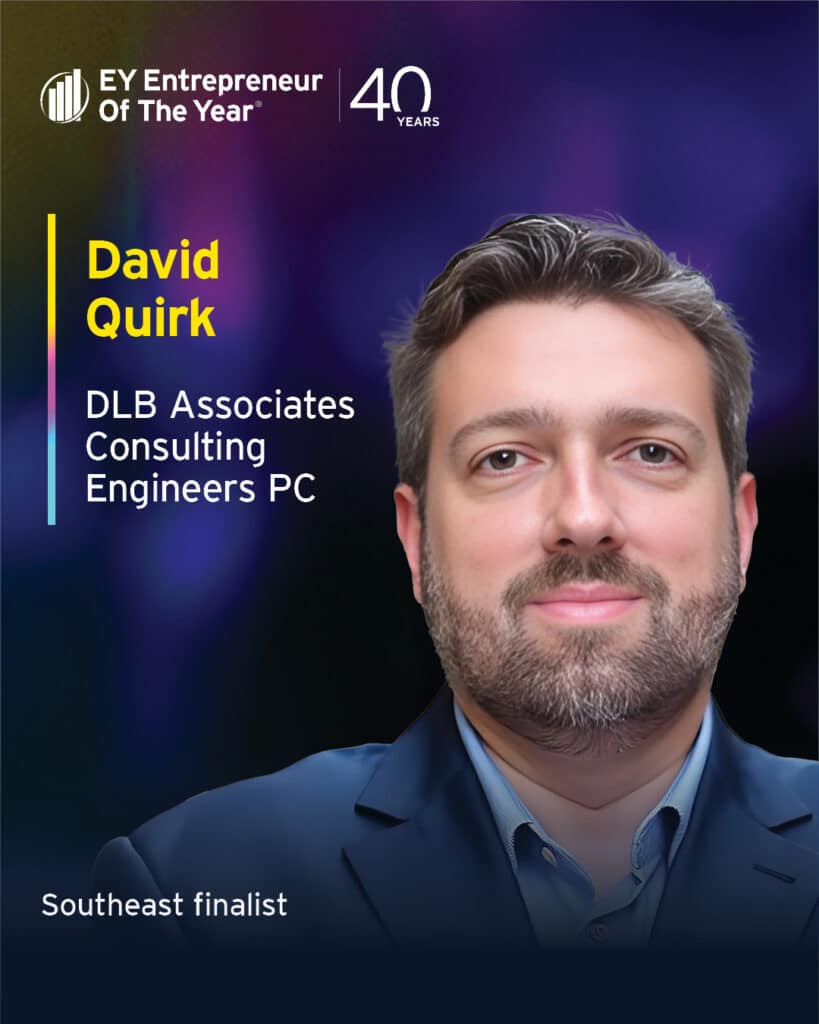
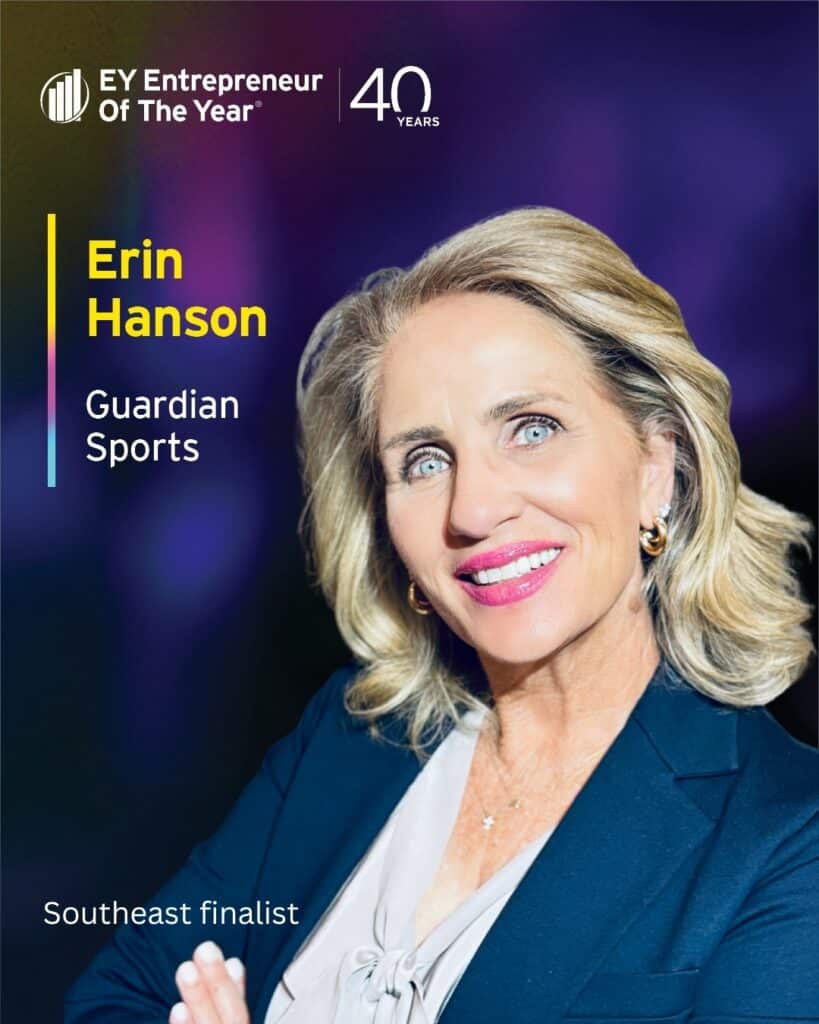
“This year’s finalists are leading examples of innovation, perseverance and resilience, illuminating paths to a brighter future for their industries and communities,” said Chevy Arnold, Entrepreneur Of The Year Southeast Program co-director.
“Their commitment to excellence transforms challenges into opportunities, inspiring us all,” added Kimberly Kicklighter, Entrepreneur Of The Year Southeast Program co-director.
Entrepreneur Of The Year honors many different types of business leaders for their ingenuity, courage and entrepreneurial spirit.
The program showcases original founders who bootstrapped their business from inception or who raised outside capital to grow their company; transformational CEOs who infused innovation into an existing organization to catapult its trajectory; and multigenerational family business leaders who reimagined a legacy business model to strengthen it for the future.
Including Quirk and Hanson, the 2025 Southeast finalists are:
- Marc Hodulich | 29029 | Atlanta, Georgia
- Damon Stafford | Alpine Intel | Charlotte, North Carolina
- Lou Hensley | Aspida | Durham, North Carolina
- Matthew Dent | Buffalo Rock Company | Birmingham, Alabama
- Melanie Little | Colonial Pipeline Company | Alpharetta, Georgia
- Will Bartholomew | D1 Training | Franklin, Tennessee
- Rene Diaz | Diaz Foods | Atlanta, Georgia
- David Quirk | DLB Associates Consulting Engineers PC | Peachtree Corners, Georgia
- Markus Scott | EyeQ Monitoring | Atlanta, Georgia
- Jon Gosier | FilmHedge | Atlanta, Georgia
- John Fitzpatrick | Force Marketing | Atlanta, Georgia
- Dr. Barry Patel | Galt Companies | Atlanta, Georgia
- Dr. Wade Smith | Galt Companies | Atlanta, Georgia
- Charles Gillespie | Gambling.com Group | Charlotte, North Carolina
- Kevin McCrystle | Gambling.com Group | Charlotte, North Carolina
- Mike Griffin | Griffin Brothers Companies | Cornelius, North Carolina
- Erin Hanson | Guardian Sports | Peachtree Corners, Georgia
- Dan Beem | Hissho Sushi | Charlotte, North Carolina
- Aaron Siegel | Home Team BBQ | Charleston, South Carolina
- Marc Murphy | Ignite Digital Services | Charleston, South Carolina
- Miller Chalk | Inglett & Stubbs, LLC | Mableton, Georgia
- Liza Rodewald | Instant Teams | Southern Pines, North Carolina
- Stephen Andresen | McClancy Foods & Flavors | Fort Mill, South Carolina
- Travis LeFever | Mission Mobile Medical Group | Greensboro, North Carolina
- Cyrus Mojdehi | Northway Homes | Charlotte, North Carolina
- Connor Ryan | NutraSky | Alpharetta, Georgia
- Fritz Owens | OTR Solutions | Roswell, Georgia
- Christopher Chuang | Relay, Inc. | Raleigh, North Carolina
- Kurt Jacobus | restor3d, Inc. | Durham, North Carolina
- Tom Kendrot | Shearwater Health | Nashville, Tennessee
- Teak Shore | Southern Lighting Source | Cumberland, Georgia
- Cindy Eckert | Sprout Pharmaceuticals | Raleigh, North Carolina
- Bryan Moore | TalkShopLive Inc. | Nashville, Tennessee
- Tina Moore | TalkShopLive Inc. | Nashville, Tennessee
- Igor Marinelli | Tractian | Atlanta, Georgia
- Joan Butters | Xsolis | Franklin, Tennessee
You can learn more about the finalists at ey.com/en_us/entrepreneur-of-the-year-us/southeast/winners-finalists.
Regional award winners will be announced on June 25 during a special celebration. The winners will then be considered by the national independent panel of judges for the Entrepreneur Of The Year National Awards, which will be presented in November at the annual Strategic Growth Forum®, one of the nation’s most prestigious gatherings of high-growth, market-leading companies.

About Entrepreneur Of The Year
Founded in 1986, Entrepreneur Of The Year has celebrated more than 11,000 ambitious visionaries who are leading successful, dynamic businesses in the U.S., and it has since expanded to nearly 60 countries globally.
The U.S. program consists of 17 regional programs whose panels of independent judges select the regional award winners every June. Those winners compete for national recognition at the Strategic Growth Forum® in November where national finalists and award winners are announced.
The overall national winner represents the U.S. at the EY World Entrepreneur Of The Year™ competition.
For more about the award, visit ey.com/us/eoy.
Related
Business
SCB Construction Group Partners with CGA Reps on New Peachtree Corners HQ
Published
1 month agoon
April 15, 2025
SCB Construction Group, freshly rebranded from SteelCo, secures construction project with CGA Reps for new office HQ in Peachtree Corners
SCB Construction Group has announced a strategic partnership with CGA Reps to build a new office headquarters in Peachtree Corners. The project, encompassing approximately 26,000 square feet of innovative workspace, marks a significant milestone in advancing CGA Reps’ corporate vision while showcasing SBA Construction Group’s commitment to delivering transformative construction solutions.
In collaboration with Oakley Real Estate Partners — serving as developers of the project on behalf of CGA Reps — this venture reflects a united effort to bring cutting-edge design (from Smallwood architecture firm) and operational excellence to the commercial kitchen equipment industry.
The announcement follows several high-profile projects for SCB Construction Group in 2024, including a 72,500-square-foot manufacturing center and headquarters for Process Equipment & Controls, an impressive interior build-out for Courtesy Ford Conyers’ commercial service center and the Phase 1 completion for StoreEase Loganville — recently honored as a 2024 Smart Facility of the Year by Modern Storage Media.
A bold new chapter for CGA Reps
The new 25,890-square-foot headquarters is designed to be more than just a workplace — it is envisioned as an inspiring environment that serves both client engagements and employee creativity. CGA Reps is recognized as an industry expert in commercial kitchen equipment, representing leading manufacturers, warehousing, distributing and installing everything from fryers to commercial walk-in freezers.
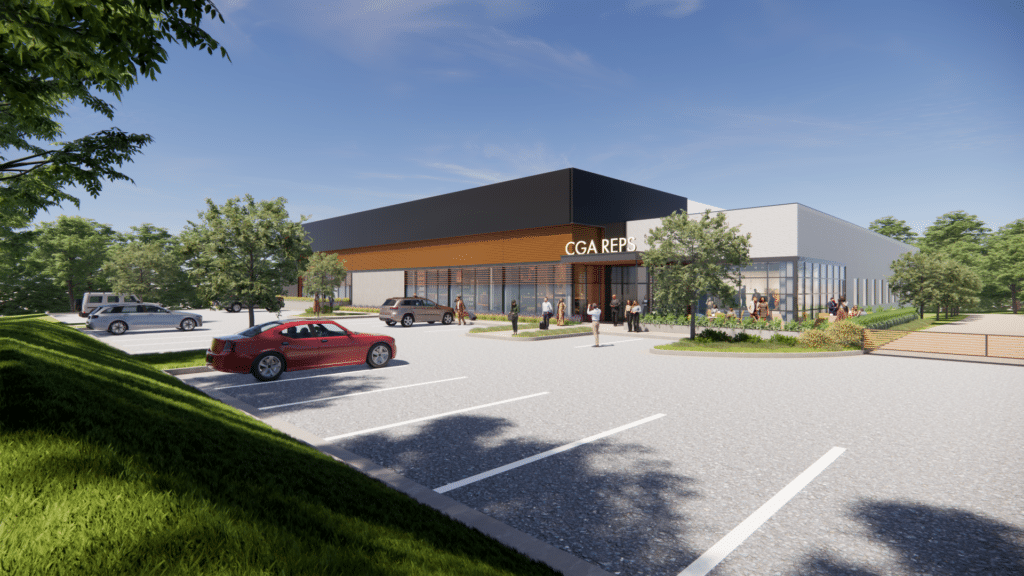
The facility’s design reflects this expertise, featuring a dedicated approximately 9,000-square-foot showroom kitchen that will host equipment demonstrations, tradeshows and webinars. This dynamic space will allow CGA Reps to showcase its comprehensive product range and provide clients with hands-on experiences of the latest commercial kitchen innovations.
A standout feature of the project is its innovative approach to stormwater management. With the site comprising only three acres, sufficient space for a traditional detention pond does not exist. To overcome this challenge, the design includes an underground detention system located beneath the truck court to efficiently handle all stormwater runoff.
This solution not only maximizes the use of the available land but also reinforces CGA Reps’ commitment to sustainable practices.
“We are excited to embark on this project with CGA Reps,” said Jay Bailey, CEO of SCB Construction Group. “This partnership underscores our commitment to customer excellence in design and construction, and it is a testament to the trust our clients place in our ability to deliver projects that not only meet but exceed expectations.”
Delivering excellence through proven expertise
SCB Construction Group’s track record in 2024 has been nothing short of remarkable. Earlier in the year, the company completed a 72,500 square foot manufacturing center for Process Equipment & Controls, integrating office space within a dynamic production facility.
This project was celebrated for its innovative design that balanced operational efficiency with a modern aesthetic, utilizing IMP panels to mimic tilt-up concrete, setting new standards for manufacturing environments.
Similarly, the interior build-out for Courtesy Ford Conyers’ commercial service center demonstrated SCB Construction Group’s ability to transform conventional spaces into functional and attractive environments that cater to both customer and staff needs.
The company’s commitment to quality and precision was again evident in the successful Phase 1 completion for StoreEase Loganville. This project, which recently earned the distinction of a 2024 Smart Facility of the Year by Modern Storage Media, highlights SCB Construction Group’s forward-thinking approach to construction and design, incorporating smart technologies and design that enhance sustainability and operational efficiency.
A rebranding that reflects a vision for the future
In a move that signals its evolution and growth, SCB Construction Group has recently rebranded from its former identity, SteelCo Buildings, as it spins off its construction division. This strategic rebranding is not merely cosmetic — it represents a renewed commitment to capabilities, credibility and client-focused service.
The refreshed brand is anchored by a new tagline “Deep Expertise, High Expectations” and a clear brand promise that communicates the company’s mission: to craft exceptional construction experiences based on precision, innovation and trust.
“Our rebranding is about more than just a new name or logo; it’s a renewed promise to our clients and communities,” explained Robert Lee, marketing director at SCB Construction Group. “We believe that our updated brand identity, including our invigorated tagline and mission statement, encapsulates our dedication to pushing the boundaries of design and construction. It reflects our commitment to creating spaces that are as inspiring as they are functional.”
Transforming spaces to inspire and connect
The new headquarters for CGA Reps is expected to become a landmark facility in Peachtree Corners. Beyond its impressive architectural design and advanced construction techniques, the building is planned as a hub for innovation and collaboration.
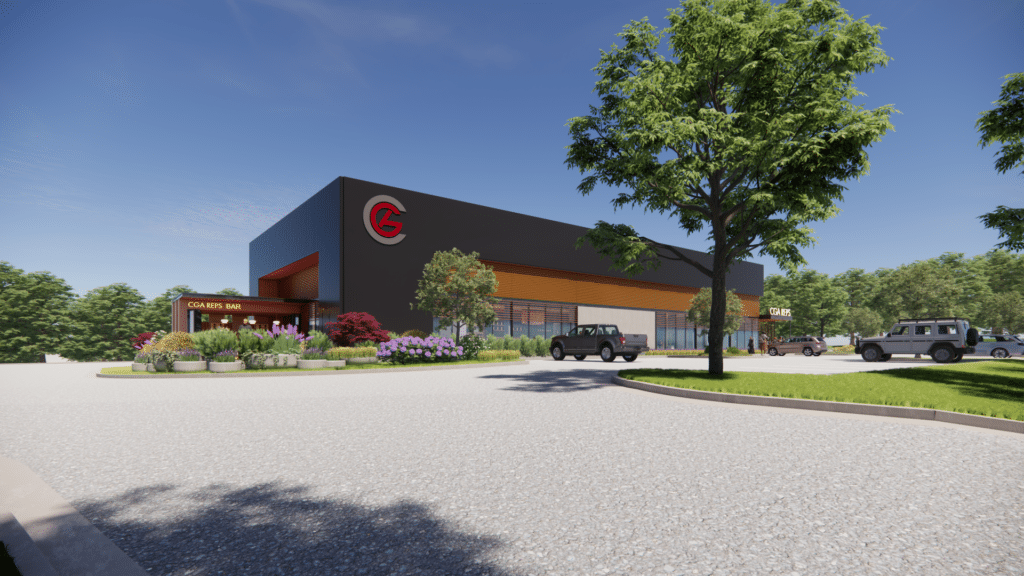
The interior build-out will include dynamic client reception areas, interactive meeting rooms, and dedicated spaces designed to foster creativity and teamwork among employees. The layout is crafted to ensure that every area of the facility contributes to a productive and inspiring work environment.
“By investing in this state-of-the-art facility, CGA Reps is making a strong statement about the future of work,” said Bryan Young, VP of construction at SCB Construction Group. “Our team is dedicated to designing and building spaces that not only serve the immediate needs of our clients but also create environments that motivate and inspire. The new headquarters will be a testament to that vision.”
Looking ahead
The partnership between SCB Construction Group and CGA Reps marks a significant step forward for both companies. As SCB Construction Group continues to build on its legacy of excellence and innovation, this project is poised to set a new benchmark for modern office headquarters design in the region.
With a strategic focus on creating spaces that inspire, connect and drive success, the future looks promising for both SCB Construction Group and its esteemed partner, CGA Reps.
For more information on the new headquarters project or to learn more about SCB Construction Group’s portfolio, visit scbcg.com.
Related
Read the Digital Edition
Subscribe
Keep Up With Peachtree Corners News
Join our mailing list to receive the latest news and updates from our team.
You have Successfully Subscribed!

Digital Edition

Official City Merchandise Line Debuts This Saturday at Town Green

Paul Duke STEM High School Student Earns CGO Scholarship

World Blood Donor Day Starts Here: Theo’s Miracle, Katherine’s Mission [Podcast]

Executive Function: A Tribute to Working Moms

Peachtree Corners Grows Business Opportunities Through Economic Development

Peachtree Corners Hosts Discussion About the Future of Local Policing

Simpson Elementary Marks Exceptional Children’s Week

Local Special Olympics Pickleball Team Honored with State House Resolution

Atlanta’s Dog Howl-O-Ween Festival Moving to Peachtree Corners for 2025

D1 Training Brings New Fitness Concept to Peachtree Corners

Peachtree Corners Hosts Discussion About the Future of Local Policing

City of Peachtree Corners Awarded Certificate of Achievement From GFOA for Seventh Straight Year

Simpson Elementary Marks Exceptional Children’s Week

Executive Function: A Tribute to Working Moms

Official City Merchandise Line Debuts This Saturday at Town Green

Light up the Corners [Video]

Capitalist Sage: Business Leadership in Your Community [Podcast]

Cliff Bramble: A Culinary Adventure through Italy

Top 10 Brunch Places in Gwinnett County

A Hunger for Hospitality

THE CORNERS EPISODE 3 – BLAXICAN PART 1

Top 10 Indoor Things To Do This Winter

The ED Hour: What it takes to Remove Barriers from Education

Peachtree Corners Life
Topics and Categories
Trending
-
City Government3 days ago
Peachtree Corners Hosts Discussion About the Future of Local Policing
-
Fitness2 days ago
D1 Training Brings New Fitness Concept to Peachtree Corners
-
Pets & Animals1 day ago
Atlanta’s Dog Howl-O-Ween Festival Moving to Peachtree Corners for 2025
-
Sports6 hours ago
Local Special Olympics Pickleball Team Honored with State House Resolution





